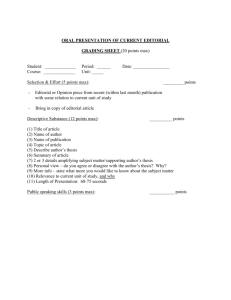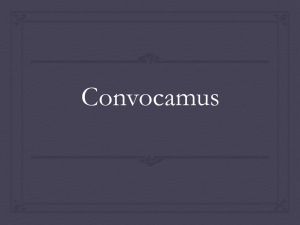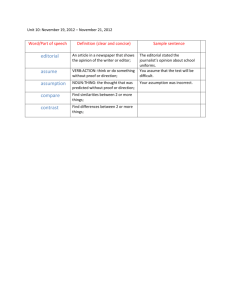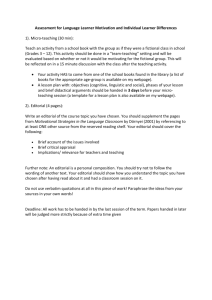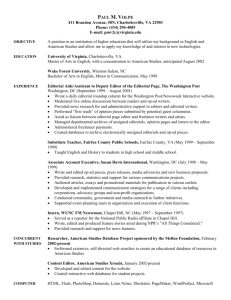Press Rights Commission PowerPoint on edit policies
advertisement
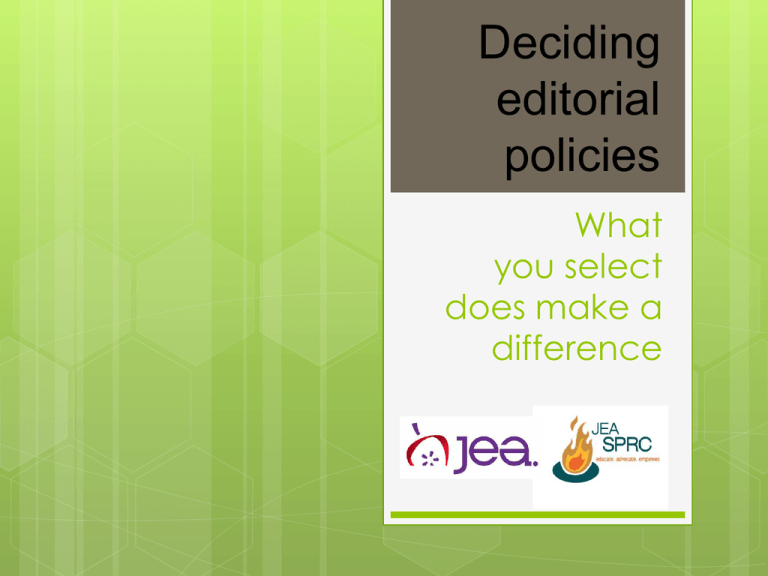
Deciding editorial policies What you select does make a difference Choosing editorial policies • Statement of mission and journalistic principles • Statement of forum status/ prior review • Role of the publication/media • Role of the adviser/school system • Rights and responsibilities of the student staff • Who makes final decisions of all content • Letters to the editor, advertisement policy, how to handle death reporting, use of others’ images, photo-manipulation • Consistency between student media policies • Other sections as needed Choosing editorial policies Closed forum Limited forum Designated open forum for student expression Forums by policy/forums by practice Do you know which type you are – and why? Why is the designation important? Hint: 2nd Circuit decision—Ithaca; Seattle; Dean and Lange New rule: “designated public forum” & state clearly that “students make all final decisions of content” Choosing editorial policies Don’t call yourselves “limited” forums because of the Ithaca decision’s findings – does it mean limited in terms of content or in terms of who has protected speech rights? Clearly outline that student staffers make all final decisions of content; advisers make no decisions Outline the decision-making process Best protection is for a board-level policy; policy established by practice next Outline clearly the roles of all involved Choosing editorial policies “When questions of good taste arise, or those which surpass social norms of good taste and decency, they shall be resolved in consultation with the involved reporter(s), the managing editor, the executive editor and the advisers.” “material not generally “ The XXXXXX adviser and/or editors have the right to deny acceptable to this publication of any editorial, column, review, or comment.” community” or “To create a Wording like “significant wholesome publication is minority or the school spirit “ an open and to support majority of the forum” but community.” the best superintendent traditions of the school; has final say, To promote and etc encourage schoolDevelop acceptable methods for sponsored activities; preserving the constitutional provision • To serve as public for free speech.” relations media “material that endorses any To promote cooperation among candidate for public office or taxpayers, parents, the school and takes a political stand on any its students issue.” Choosing editorial policies Mission: Accurate, thorough, fair (in terms of background and perspective) reporting accomplished while maintaining professional standards and integrity; Interviewing and researching using the best and most reliable sources available Status: designated public forum for student expression Unprotected speech: libel, obscenity, material disruption of the school process, copyright infringement, unwarranted invasion of privacy Letters to the editor: Run all letters (based on staff and space decisions and constraints). If there are content, authorship or grammatical questions, return the letter to author for resubmission Obituary, advertising, Web and photo manipulation: Have policies in place to avoid confusion or decisions that result in “viewpoint discrimination.” Apply your policies consistently: (all student media should be the same). : Choosing editorial policies A weak policy, a wrong one, is the first step on the long road to prior review – censorship and loss of your credibility and of responsible journalism that truly serves the needs of its communities. For sample policies, modes and more information: http://jeasprc.org or http://jeapressrights.org For contact: jabowen@kent.edu
